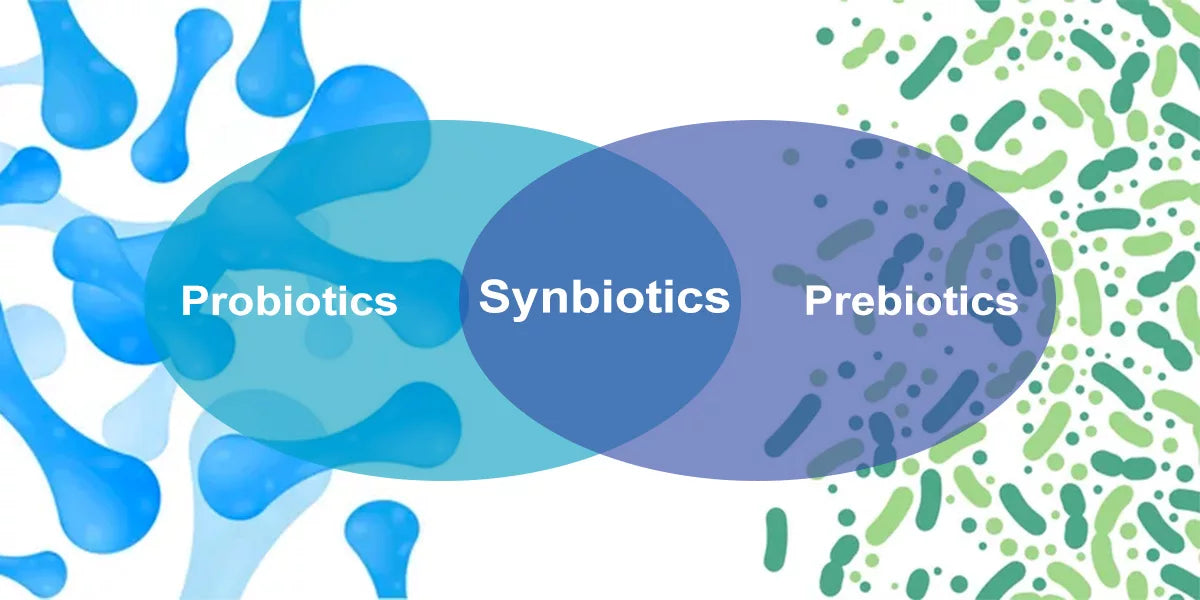
Introduction: Maintaining a healthy gut is essential for overall well-being, and the use of prebiotics, probiotics, and synbiotics has gained significant attention for their potential to support gut health. While these terms are often used interchangeably, they represent distinct components with unique roles in promoting a balanced gut microbiome. In this blog post, we'll explore the differences between prebiotics, probiotics, and synbiotics, and how each can contribute to gut health and overall wellness.
Understanding Prebiotics: Prebiotics are non-digestible dietary fibers that serve as fuel for beneficial bacteria in the gut. Unlike probiotics, which are live microorganisms, prebiotics are essentially food for these beneficial bacteria. Common prebiotics include fructooligosaccharides (FOS), inulin, and resistant starch, which pass through the digestive tract intact and reach the colon, where they are fermented by gut bacteria. By nourishing beneficial bacteria such as Bifidobacteria and Lactobacilli, prebiotics help to promote the growth of these beneficial microbes, thus supporting gut health and overall digestive function.
Exploring Probiotics: Probiotics are live microorganisms that confer health benefits when consumed in adequate amounts. These beneficial bacteria and yeasts, such as Lactobacillus, Bifidobacterium, and Saccharomyces, can be found in fermented foods like yogurt, kefir, sauerkraut, and kombucha, as well as in supplement form. When ingested, probiotics colonize the gut microbiome, crowding out harmful pathogens and promoting a balanced microbial ecosystem. Probiotics have been shown to support digestive health, boost immune function, alleviate symptoms of irritable bowel syndrome (IBS), and even improve mood and mental well-being.
Introducing Synbiotics: Synbiotics combine prebiotics and probiotics into a single formulation, offering the benefits of both in one convenient package. By providing a substrate for beneficial bacteria to thrive and delivering live microorganisms directly to the gut, synbiotics offer a synergistic approach to promoting gut health and microbial balance. These products often contain a specific strain or combination of probiotic organisms, along with prebiotic fibers to support their growth and viability. Synbiotics may enhance the survival and effectiveness of probiotics while maximizing their beneficial effects on the gut microbiome.
Choosing the Right Option for You: When it comes to selecting the right gut health solution, it's essential to consider your individual needs and preferences. Prebiotics are ideal for individuals looking to support gut health through dietary fibers that nourish beneficial bacteria. Probiotics may be beneficial for those seeking to replenish or maintain a healthy balance of gut microbes, especially after antibiotic use or digestive disturbances. Meanwhile, synbiotics offer a comprehensive approach by combining prebiotics and probiotics to optimize gut health and microbial diversity.
Conclusion: Prebiotics, probiotics, and synbiotics each play unique roles in supporting gut health and overall well-being. Whether you're looking to boost beneficial bacteria, promote digestive function, or maintain microbial balance, these gut health solutions offer a range of options to suit your individual needs. By incorporating these functional ingredients into your diet or supplementation regimen, you can take proactive steps towards cultivating a healthy gut microbiome and enjoying the numerous benefits it offers for your health and vitality.


